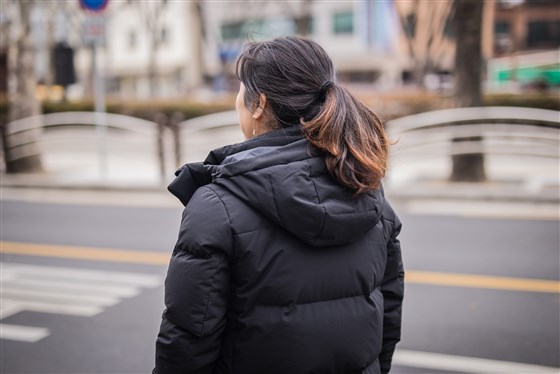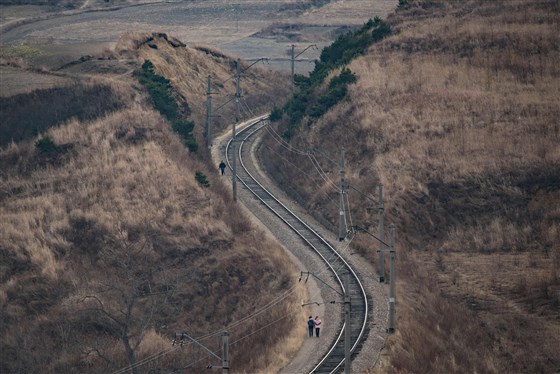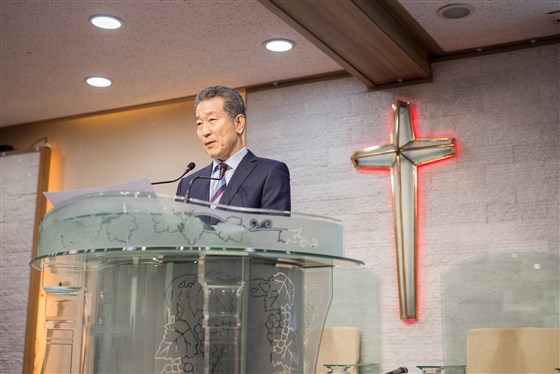
by Erik Ortiz / Feb. 23, 2018 / 10:00 AM null / Updated
Feb. 23, 2018 / 10:02 AM null
SEOUL, South Korea - Lee Meng Zu was 18 when she illegally entered the hinterlands
of China, lured by the promise of a dishwashing job at a restaurant that surreptitiously
employed North Koreans.
In 1998, after crossing a river near her home in North Korea's
Hamgyong Province, she said she learned the awful truth: The restaurant owner
was buying her as a bride for one of his sons. She's not sure the exact amount
the man paid the broker, but Lee learned that other women in similar positions
were worth about $1,000 to $2,000.
“It's all very embarrassing,” Lee said Thursday through a translator. “It was never my will to be sold.”

▲ Lee Meng Zu defected from North Korea to South Korea in 2008
after she was initially the victim of human trafficking. She now lives in Seoul.Brock
Stoneham / NBC News
She eventually managed to escape to South Korea, and, 20 years
later, Lee reflected on her brief life as a pawn in the human and sex trafficking
trade with a sense of relief. As the problem persists - with little repercussions against those who buy or sell women
- Lee says she is one of the lucky ones.
“I'm sad about it for others trapped,” she said, “and I'm angry.”
While the exact number of North Korean defectors who are forced
into human trafficking in China and other Asian nations is unclear, experts
say there is an uptick in women who are leaving the North to defect to South
Korea.
In 1998, at the height of a famine that ravaged North Korea, just
12 percent of the nearly 950 North Korean defectors were women, according to
the South Korean government's Ministry of Unification.
In 2017, an estimated 83 percent of the more than 1,120 North
Koreans who defected were female.
That switch has taken place over the past several years, observers
say, as women generally have an easier time going unnoticed when they cross
into China.
In addition, North Korean women are wanted as sex slaves or to
be married off in China, which has 30 million more men than women, government
data shows.
Liberty in North Korea, a nongovernmental organization that has
aided in more than 700 refugee rescues, says women who flee also live in fear
of being sent back to the North because the Chinese government forcibly repatriates
North Koreans. They might be tortured, forced to undergo an abortion if they
became pregnant by a Chinese man, or interned in a prison camp, according to
the group.
The experiences of North Korean defectors are often difficult
to verify.
Sokeel Park, the Seoul-based director of research and strategy
for Liberty in North Korea, said the women are caught between two dire extremes:
remaining in China against their will or being rescued by the Chinese only to
be sent back to North Korea.
“If you're a North Korean woman who has been trafficked, you
can't just run away,” Park said. “If you're being exploited or abused or in sex work, you don't
want to go to the police. That vulnerability is what contributes to this continued
exploitation.”
He added that while the international community, including the
United Nations, has come down on China in recent months for failing to adequately
fight human trafficking and protect refugee defectors, there's nothing to suggest
the government in Beijing will change course.
“This is just so bad. There's no other way of saying it,”
Park said.
Related: How one North Korea defector is helping other refugees
As a teenager in the North, Lee said, she went to a school that
groomed entertainers, with dreams of being selected to sing and dance on state-run
television or before important figures in the Kim family regime.
The height requirement was just over 5-foot-2. She was about 2
inches too short.
Desperation during North Korea's famine of the 1990s made her
realize that opportunities were ultimately limited if she couldn't rise in the
ranks of society. Some estimated that more than 2 million people died in one
of modern history's rare peacetime famines.
Lee heard from Chinese-Korean businessmen who would visit her
grandmother's market about job opportunities across the border. That's how she
ended up being sold as a bride. But the restaurant owner's son, whom she was
to marry, was still in the army and had yet to return, she said.
In the nick of time, Lee made her escape.

▲ People make their way along a railway track near Chongjin in
the Hamgyong Province on North Korea's northeast coast on Nov. 21, 2017.ED JONES
/ AFP - Getty Images
She and a cousin who had also fled North Korea ended up meeting
other Koreans in China. In 1999, Lee said, she got passage on a ship that allowed
people without passports to travel to South Korea. But the ship was infiltrated
by North Korean officers who ended up sending them back.
Lee said she was thrown into a North Korean prison, but because
she was still a teenager, they released her after one month.
Undeterred by her experience of being bought and captured, she
reconnected with her family, and explained how China's shift to capitalism could
afford a better life. She said her father gave her the equivalent of $20 - enough to bribe a North Korean military guard to let her cross
the border.
Once in China, she was on her own. She eventually met a South
Korean man living in China with whom she had a son, ultimately staying in the
country for nine years
After they broke up, Lee found work as a tour guide in the city
of Shenyang, about 235 miles from the North Korean border. She said she met
producers of a documentary who introduced her to a faith-based group called
Durihana and its businessman-turned-Christian pastor, Ki-won Chun, who had helped
North Korean refugees start fresh in South Korea since 1999.
Chun said about 99 percent of defectors to China enter the country
via human trafficking.
“Because there's high demand for women in China, people in China
will pay border patrol to bring women over,”
he added. “The North Koreans know that they're being sold when they escape,
so they naturally fall into human trafficking.”
Chun has become one of South Korea's best-known advocates for
rescuing North Korean refugees, earning the nickname the “Asian Schindler,”
after Oskar Schindler, the German industrialist who is credited
with saving Jewish workers from the Nazis during World War II.
“North Korea announces that they'll kill me once or twice a year,”
Chun said.
“China is emphatic about wanting to capture me.”

▲ South Korean pastor Ki-won Chun speaks at Durihana church in
Seoul on Feb.18, 2018. Chun has been helping North Korean refugees defect to
South Korea since 1999.Brock Stoneham for NBC News
His group has helped hundreds of people like Lee settle into South
Korea, where the government temporarily houses and educates defectors before
giving them financial assistance.
Lee changed her name after arriving in the South in 2008, but
still fears reprisals by the North Korean government against her parents and
a sister living there.
In South Korea, Lee met a man through her job as an office assistant.
On their first date, he took her to a movie. They married in 2011 and have two
sons.
“I felt like he was being protective of me,” she said.
“I'm lucky.”
Today, Lee has found salvation in Seoul. While she never got to
be an entertainer, she isn't shy about picking up a guitar and singing the South
Korean songs that she secretly learned while growing up in the North.
While recently watching the Winter Olympics, taking place about
80 miles to the east in the mountain resort of PyeongChang, she saw a group
of North Korean musicians on television performing as part of the North's Olympic
delegation.
She said she remembered those long-forgotten melodies, thought
of the family she may never see again, and cried. 